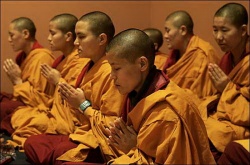Difference between revisions of "Jikaku"
(Created page with "thumb|250px| <poem> Jikaku [慈覚] (794–864) Also known as Ennin or the Great Teacher Jikaku. The third chief priest of [[Enryaku-ji]...") |
|||
| Line 2: | Line 2: | ||
<poem> | <poem> | ||
[[Jikaku]] | [[Jikaku]] | ||
| − | [慈覚] (794–864) | + | [[慈覚]] (794–864) |
| − | Also known as [[Ennin]] or the [[Great Teacher Jikaku]]. The third chief priest of [[Enryaku-ji]], the head [[temple]] of the [[Tendai]] school on {{Wiki|Mount Hiei}} in [[Japan]]. Born in Shimotsuke Province, in 802 he began to study under [[Kochi]] at [[Daiji-ji temple]]. In 808 he entered {{Wiki|Mount Hiei}} and became a [[disciple]] of [[Dengyo]], the founder of the {{Wiki|Japanese}} [[Tendai]] school. In 838 he journeyed to {{Wiki|China}}, where he studied [[Sanskrit]] and [[Esoteric]] [[Buddhism]]. He was anointed in an [[Esoteric | + | Also known as [[Ennin]] or the [[Great Teacher]] [[Jikaku]]. The third [[chief priest]] of [[Enryaku-ji]], the {{Wiki|head}} [[temple]] of the [[Tendai]] school on {{Wiki|Mount Hiei}} in [[Japan]]. Born in {{Wiki|Shimotsuke Province}}, in 802 he began to study under [[Kochi]] at [[Daiji-ji temple]]. In 808 he entered {{Wiki|Mount Hiei}} and became a [[disciple]] of [[Dengyo]], the founder of the {{Wiki|Japanese}} [[Tendai]] school. In 838 he journeyed to {{Wiki|China}}, where he studied [[Sanskrit]] and [[Esoteric]] [[Buddhism]]. He was anointed in an [[Esoteric Buddhist]] [[ritual]] by [[Ch'yan-ya]]. He also studied the [[T'ient'ai]] [[doctrine]] and received a copy of [[T'ient'ai]]'s Great [[Concentration]] and [[Insight]] from [[Chih-yüan]] at {{Wiki|Mount Wu-t'ai}}. He proceeded to {{Wiki|Ch'ang-an}}, where he was instructed in the [[esoteric]] [[doctrines]] of the [[Diamond Realm]] and the [[Womb Realm]] by [[Yüan-cheng]], [[I-chen]], and [[Fa-ch'yan]]. [[Jikaku]] also studied the [[doctrines]] of the [[T'ient'ai]] school under [[Tsung-ying]]. In 847 he returned to {{Wiki|Japan}} and in 854 became third [[chief priest]] of the [[Tendai]] school.He had great esteem for the teachings of [[Esoteric]] [[Buddhism]] and asserted that they were {{Wiki|equal}} to the [[perfect teaching]] of the [[Lotus Sutra]]. During his [[time]] the [[Tendai]] school incorporated [[Esoteric Buddhism]] into its original [[doctrines]]. This was called [[Tendai]] {{Wiki|Esotericism}}, as distinguished from [[Kobo's]] [[True Word]] {{Wiki|Esotericism}}. [[Jikaku]] developed the [[idea]] that the [[Lotus Sutra]] and the [[Mahavairochana Sutra]] are {{Wiki|equal}} in terms of [[doctrine]] because they share the [[principle]] of three thousand [[realms]] in a [[single moment]] of [[life]], but that the latter is {{Wiki|superior}} in practice because it expounds [[mantras]] and [[mudras]], which are lacking in the [[Lotus Sutra]]. [[Jikaku]] recorded his decade of travels in {{Wiki|China}} under the title The Record of a [[Pilgrimage]] to {{Wiki|China}} in Search of the Law. |
</poem> | </poem> | ||
{{R}} | {{R}} | ||
Latest revision as of 15:25, 26 September 2013
Jikaku
慈覚 (794–864)
Also known as Ennin or the Great Teacher Jikaku. The third chief priest of Enryaku-ji, the head temple of the Tendai school on Mount Hiei in Japan. Born in Shimotsuke Province, in 802 he began to study under Kochi at Daiji-ji temple. In 808 he entered Mount Hiei and became a disciple of Dengyo, the founder of the Japanese Tendai school. In 838 he journeyed to China, where he studied Sanskrit and Esoteric Buddhism. He was anointed in an Esoteric Buddhist ritual by Ch'yan-ya. He also studied the T'ient'ai doctrine and received a copy of T'ient'ai's Great Concentration and Insight from Chih-yüan at Mount Wu-t'ai. He proceeded to Ch'ang-an, where he was instructed in the esoteric doctrines of the Diamond Realm and the Womb Realm by Yüan-cheng, I-chen, and Fa-ch'yan. Jikaku also studied the doctrines of the T'ient'ai school under Tsung-ying. In 847 he returned to Japan and in 854 became third chief priest of the Tendai school.He had great esteem for the teachings of Esoteric Buddhism and asserted that they were equal to the perfect teaching of the Lotus Sutra. During his time the Tendai school incorporated Esoteric Buddhism into its original doctrines. This was called Tendai Esotericism, as distinguished from Kobo's True Word Esotericism. Jikaku developed the idea that the Lotus Sutra and the Mahavairochana Sutra are equal in terms of doctrine because they share the principle of three thousand realms in a single moment of life, but that the latter is superior in practice because it expounds mantras and mudras, which are lacking in the Lotus Sutra. Jikaku recorded his decade of travels in China under the title The Record of a Pilgrimage to China in Search of the Law.
